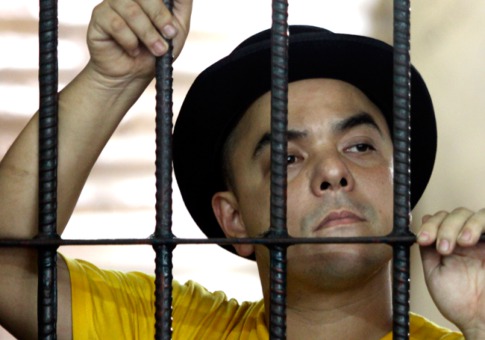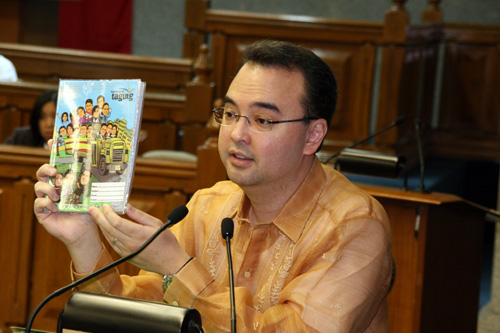What’s our problem with the Cybercrime Law? None, really, other than the utterly ham-handed insertion of a libel provision, which goes like this:
LIBEL – THE UNLAWFUL OR PROHIBITED ACTS OF LIBEL AS DEFINED IN ARTICLE
355 OF THE REVISED PENAL CODE COMMITTED THROUGH A COMPUTER SYSTEM OR
ANY OTHER SIMILAR MEANS WHICH MAY BE DEVISED IN THE FUTURE.
What’s Article 355 of the Revised Penal Code? It goes like this:
Art. 355. Libel means by writings or similar means. — A libel committed by means of writing, printing, lithography, engraving, radio, phonograph, painting, theatrical exhibition, cinematographic exhibition, or any similar means, shall be punished by prision correccional in its minimum and medium periods or a fine ranging from 200 to 6,000 pesos, or both, in addition to the civil action which may be brought by the offended party.
This, of course,deserves the question, what is libel? That is answered by Article 353 of the RPC, making this piece of legislation seem more like a magical treasure hunt than a law:
Art. 353. Definition of libel. — A libel is public and malicious imputation of a crime, or of a vice or defect, real or imaginary, or any act, omission, condition, status, or circumstance tending to cause the dishonor, discredit, or contempt of a natural or juridical person, or to blacken the memory of one who is dead
What the senators did, essentially, was copy-paste the definition of libel (which, as words on a page, are totally sound) into the
Cybercrime Law and slapped “through a computer with the Internets lol” after it.
Because, as Senator Edgardo Angara explains in deliberations recorded in the Senate Journal (which we took the liberty of reading for you): “lol cyberspace, or as they call it, the Internets, is just a new avenue lol for libel lol wtf”
What will this do to you, dear reader, from least to worst-case scenarios? Let’s face it. You’re probably not going to get thrown in
jail for Liking a funny picture of Tito Sotto as Robocop.
We suspect the DOJ Office of Cybercrime, backed by the PNP and NBI, are first going to come down hard on Anonymous Philippines, who so brazenly hacked a fistful of government websites in protest. Also, that Carlos Celdran, because he’s so goddamn outspoken and freeee.
The worst-case scenario, however, is no laughing matter: twelve years in jail, because if you commit crime with a computer, it apparently deserves the next higher degree of punishment. Also, you won’t have the Filipino Freethinkers to bail you out… Celdran.

Nobody is truly free.
But you know all this. What we’re going to talk about is how it happened, and why the production of such a law is ten times scarier
than what’s going to happen to your asshole in jail.
How did it happen? Legally, and through the proper avenues. Scared yet?
The passage of the Cybercrime Law, libel provision included, followed due process, which means:
1. A senator filed a bill from his brain. In this case, Senator Angara.
2. It was referred to a committee which held hearings, and produced a
committee report.
3.That report was then delivered to twenty-three senators, who are
expected to read and discuss it.
4. The bill went through a period of amendments, a battering of comments like “change this word to that,” “make this illegal,” and “charge 50,000 pesos rather than 10,000.”
5. The bill was voted on twice, and passed twice.
6. The bill was then sent to a bicameral conference committee, AKA the shady number-crunching area, which reported back. With, well, a report.
7. Both Houses of Congress approved that report and sent it to the President for his signature.
8. He signed it.
9. Now it’s in your life. Fucking. You. Up.
Didn’t follow? It means the Cybercrime Law went through no less than presumably three hundred pairs of eyes and three hundred brains –including that of the President of the Philippines — before it decided to. Fuck. You. Up.
What the hell were these senators thinking? Let us, two indolent indios, try to guess.
Maybe the senator was assigned to a different section of the law, or missed the libel provision all together. We’re looking at you, Pia
Cayetano and Chiz Escudero, backpedaling furiously on your votes.
This suggests that our legislators approach lawmaking like college groupwork: a cocktail of dictatorship, halfhearted contribution, and a lot of “Bahala na si Batman.”
Dear senators, read the whole damn thing because you’re going to affix your name to it. Now that the populace has wrapped its collective head around the implications of the libel provision, certain senators are trying to take it back — which obviously means they didn’t read it and are now trying to convince the angry professor that their groupmates fucked up and they’re ready to do extra work to make up for their failing grade.
Maybe the senator skimmed the law. Sure, they read it, and checked off all the obviously bad things like child porn, fraud, and
cyberprostitution, and in the process, blissfully lumped libel into the Scary Things on the Internet category. This implies that libel is
as easy to identify and condemn as child porn and fraud.
It’s not, especially because identifying malice in a badly spelled Facebook status is more complicated, than, say, identifying malice in the act of owning ten gigabytes of naked ten-year-olds.

Child Porn! Fraud! Cyberprostiution! Libel!
Finally, maybe the senator read the law, understood it fully, and approved it anyway. Thirteen out of twenty-three approved it. This is
terrifying, but it’s also the most reasonable thing to assume because it implies that the senators were doing their job.
This also implies that they know that libel has long been used (since American colonial times, in fact) to “keep dissent responsible,” and
in one infamous case, jail a man for more than two years. It also implies that they’re ready to do the same to us fucktards on the
Internet. But worse: Steeper fines and seizure of your shit. Also, more jail.
It also shows, not just implies, that legislation is based on personal experience and interest.
Take, for example, the insertion of a provision making cybersquatting a crime. Based on the Journal notes, this was not prompted by a legitimate business concern (e.g. Sulit.com.ph vs. Sulit.ph) but rather the fact that titosotto.com and lorenlegarda.com are taken, with Tito Sotto bitching that “someone else was already using [titosotto.com] and that individual, in fact, asked him for a huge amount of money in return for the right to use the same.” (Lucky for him, sleazeball.com/insensitivelyingfuck is still available. As of
this post.)
It doesn’t take someone smarter than Tito Sotto to assume that the senators who passed the bill were thinking, “Aw fuck yeah, we can
finally shut Professional Heckler down.” Because, come on, what senator has not been criticized on the Internet? Bashing Senator Manuel Villar Jr., one of those who voted for the bill, was even a backyard industry during the 2010 presidential campaign.
Nobody objected to the inclusion of the libel provision, not even Senator Guingona, whose initial opposition stemmed from the imposition of morality on cybersex. Not libel. Among the senators there, though, he was on the right track and has done the most to make up for that oversight. So, go you!

Hey, at least I opposed it.
So now the Cybercrime Law, as of yesterday, is in force. The Palace is being smug, telling us uneducated masses to read the bill in its
entirety and to utilize “proper avenues” for opposing opinions. Fact of the matter is: those proper avenues are precisely what led to this.
Meanwhile, the government is asking us to trust that they will respect our basic rights. Sure, the Aquino administration might. The next president might not. Laws are as solid as Bong Revilla’s biceps, as enduring as Tito Sotto’s mustache. It will take another law to repeal this one, and as the production of Cybercrime Law proves: it’s not a cakewalk.





